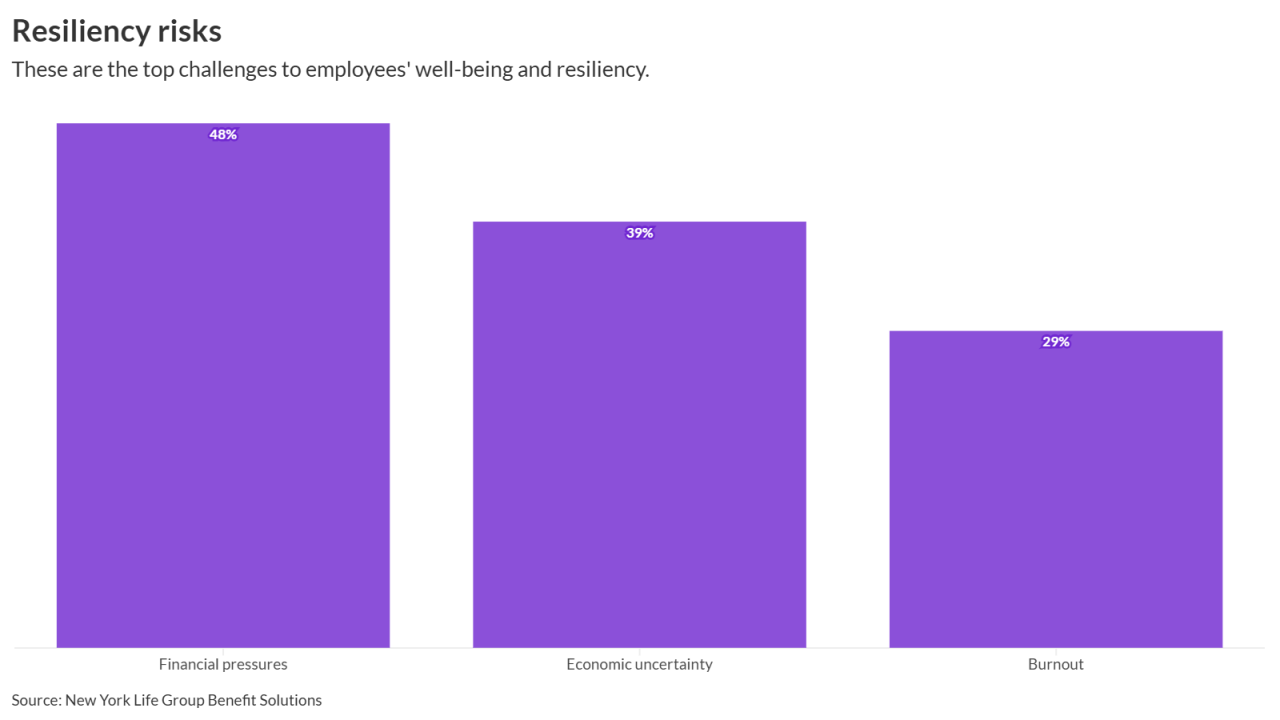Between day-to-day essentials, child care, education, summer vacations and much more, the cost of having a family has continued to skyrocket. Inflation rates reached record highs over the past year, compounding the financial challenges working parents face. A 2022 report
In spite of the well-known financial burdens working parents face, there's a disconnect between what they want and how their employers are responding. A recent Greenlight
Read more:
Through our work with HR leaders, I know that boosting engagement and retention is continuously top of mind. As benefit brokers and advisers consider recommended strategies for businesses to address this in the second half of the year, family financial benefits present a major area of opportunity.
Below are three recommendations employers can incorporate to better support the unique financial needs of working parents.
Engage in a dialogue with working parents.
The first step is to make them feel heard. HR and benefits leaders can reach out to parents to get a better sense of their primary financial stressors, how and whether they are currently utilizing all available benefits, and where gaps lie.
Consider setting up one-on-one meetings with interested parents, letting them know the goal is to better understand their needs and how the company can consider evolving its benefits package accordingly, or sending out a short survey to solicit informal feedback. Examine what trends emerge and answer key questions such as whether college expenses are the primary stressor or if financial education for kids is a top priority.
Read more:
While employers won't be able to meet everyone's needs, taking the initiative to show employees that you care about them and their family's financial wellbeing will go a long way toward building trust and belonging within their organization.
Enrich your benefits package with family-focused offerings.
Many parents face financial challenges related to budgeting, saving and managing expenses for their family. If they don't already, employers can consider offering financial planning tools and educational resources to help make this a more manageable process for parents.
Financial counseling is also a desirable benefit for working parents. Access to employee assistance programs (EAPs) or financial advisers who can guide them on the ins-and-outs of saving for college or managing debt can help parents make more informed decisions, reduce stress and improve their financial well-being.
For the 81% of parents seeking better personal finance tools for kids, there are a variety of offerings. For example, employers can make available family financial wellness platforms that help with everything from teaching kids how to budget their allowance and learning how to use a debit card to saving up for specific goals like a car, laptop or concert tickets. They can even seek out platforms that offer interactive games to help teach children financial lessons in a fun and interactive way, while lessening the burden on parents.
Read more:
Employers can also consider providing subsidies or assistance for child care expenses. This can be in the form of on-site child care facilities, partnerships with daycare centers or reimbursement programs for qualified expenses.
Implement family-friendly policies that have a financial impact.
In addition to direct financial benefits, there are a number of policies that employers can implement that will help address the financial needs of parents. This includes paid parental leave, which the U.S. Bureau of Labor Statistics notes is currently only available to
Flexible or remote work arrangements can provide parents with both peace of mind and alleviate financial burdens. Flexible hours or schedules, along with the ability to work remotely either full-time or part-time, can help parents balance their professional and parental responsibilities more effectively and reduce child care costs. Employers can also consider conducting regular pay audits to identify and address any gender or family status-based pay gaps, ensuring fair and equal compensation for all employees.
Read more:
Employees don't expect employers to meet every one of their financial needs, nor is that realistic. However, by taking the time to listen to their needs and incorporating selective benefits and policies that are explicitly tailored toward the financial pressures that working parents face, companies can take meaningful strides to build a more inclusive and supportive workplace. As benefit advisers, we owe it to our clients to help them strengthen the financial safety net for the working parents who represent one of their most valuable assets.





